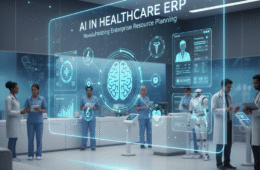
Introduction – The Role of ERP in Modern Businesses
Enterprise Resource Planning (ERP) systems have become the backbone of modern businesses, enabling seamless integration of key processes such as finance, supply chain, human resources, and customer management. By centralizing data and automating routine operations, ERP systems empower organizations to make faster and more informed decisions. However, despite their immense benefits, traditional ERP implementations often come with significant challenges, including long deployment times, high costs, and frequent errors in data migration.
With the increasing complexity of business operations, companies are seeking ways to optimize ERP deployment without compromising efficiency. This is where Artificial Intelligence (AI) steps in as a game-changer. By integrating AI into ERP systems, businesses can accelerate implementation timelines, reduce costs, and minimize errors, ensuring a smoother transition from legacy systems. AI-driven insights allow companies to predict optimal workflows, automate repetitive tasks, and enhance user training, making the ERP adoption process significantly more efficient.
For organizations considering ERP solutions, understanding how AI contributes to faster and cost-effective implementation is crucial. In this blog, we will explore the challenges of traditional ERP deployments, the transformative role of AI, real-world benefits, and best practices for partnering with the right ERP Software Development Company to leverage AI-driven ERP solutions effectively.
Challenges of Traditional ERP Implementation
While ERP systems offer remarkable benefits, traditional ERP implementations often present significant challenges for businesses. One of the primary hurdles is the high cost associated with deploying ERP solutions. Organizations need to invest heavily in software licenses, hardware infrastructure, and expert consulting services. Moreover, unforeseen issues during implementation can lead to budget overruns, making ERP deployment a costly endeavor for many companies.
Another major challenge is the lengthy implementation timeline. Traditional ERP projects can take several months or even years to fully deploy, as businesses must carefully plan, customize, and integrate the system with existing workflows. This prolonged timeline can disrupt daily operations and delay the expected return on investment.
Data accuracy and integrity are also critical concerns. During migration from legacy systems, manual errors can occur, leading to inconsistent or corrupted data. This not only slows down the implementation process but can also impact business decisions if inaccurate information is relied upon.
For businesses in dynamic markets, such as the UAE, selecting the right partner is crucial. An experienced ERP Software Development Company in Dubai can help navigate these challenges by providing expert guidance, reducing risks, and ensuring smoother integration.
Understanding these obstacles highlights the importance of leveraging advanced technologies like AI to streamline ERP deployment, minimize costs, and accelerate timelines—topics we will explore in the next sections.
How AI is Transforming ERP Implementation
Artificial Intelligence (AI) is revolutionizing the way businesses approach ERP implementation, making the process faster, more accurate, and cost-efficient. By automating routine tasks and providing intelligent insights, AI significantly reduces the time and resources traditionally required for ERP deployment.
AI-Powered Process Automation
AI automates repetitive and time-consuming tasks during ERP setup, such as workflow configuration and data entry. This not only speeds up implementation but also minimizes human errors, ensuring a smoother transition. Businesses can now focus on strategic objectives instead of spending weeks on manual system setup.
Predictive Analytics for Faster Decision Making
With AI-driven predictive analytics, companies can analyze historical data to determine optimal ERP configurations. This allows decision-makers to anticipate potential bottlenecks and implement solutions proactively, reducing delays in deployment. Predictive insights also help in forecasting resource requirements, ensuring that the ERP project stays within budget.
Intelligent Data Migration and Cleansing
Data migration is often one of the most challenging aspects of ERP implementation. AI tools automatically detect inconsistencies, errors, or duplications in legacy data, streamlining the migration process. This reduces risks and ensures that the new ERP system is populated with accurate, reliable information from day one.
Enhanced User Experience and Training with AI
AI-powered chatbots and virtual assistants simplify ERP training for employees. They provide real-time guidance, answer queries, and offer interactive tutorials, reducing onboarding time. As a result, businesses experience fewer errors post-implementation and faster adoption across teams.
By leveraging AI, companies partnering with an experienced ERP Software Development Company can drastically cut ERP implementation timelines and costs. Whether it’s automation, predictive analytics, or intelligent data management, AI ensures a more efficient, reliable, and scalable ERP deployment.
Quantifying the Benefits – Time and Cost Savings
Integrating AI into ERP implementation offers measurable benefits in both time reduction and cost efficiency. Traditional ERP projects often face delays due to manual processes, complex configurations, and data migration challenges. AI addresses these issues by automating tasks, providing predictive insights, and ensuring data accuracy, resulting in faster and more reliable deployments.
Reduction in Implementation Time
Companies leveraging AI in ERP deployment report significant reductions in implementation timelines. Tasks that previously took weeks, such as workflow setup, system customization, and user training, can now be completed in a fraction of the time. AI-driven process automation enables organizations to launch ERP systems faster, ensuring minimal disruption to daily operations. By accelerating deployment, businesses can start realizing the benefits of their ERP investment sooner.
Cost Efficiency Through AI Integration
AI not only saves time but also reduces costs associated with ERP projects. Automated workflows and intelligent data migration minimize the need for extensive consulting and manual labor, lowering implementation expenses. Predictive analytics help in optimizing resource allocation, preventing budget overruns. Furthermore, AI-powered training tools reduce post-deployment errors, decreasing support and maintenance costs over time.
For companies seeking global solutions, collaborating with an experienced ERP Software Development Company ensures that AI tools are effectively implemented, maximizing ROI. In markets such as Dubai and Kuwait, businesses have successfully reduced ERP implementation costs by up to 30–40% through AI-driven approaches.
By quantifying these benefits, it becomes clear that AI is not just a technological enhancement—it’s a strategic advantage for businesses aiming to implement ERP systems efficiently and economically.
Real-World Examples of AI in ERP
AI has proven its transformative impact on ERP implementation across industries, helping businesses reduce costs, accelerate timelines, and enhance operational efficiency. Real-world examples demonstrate how AI-driven ERP systems are reshaping enterprise management globally.
Manufacturing Industry
In manufacturing, AI-enabled ERP systems optimize supply chain operations and production planning. Predictive analytics forecast demand, allowing manufacturers to adjust inventory levels and avoid overstock or shortages. Automation reduces manual data entry and speeds up reporting, cutting ERP implementation time significantly. Companies partnering with an ERP Software Development Company have reported faster deployment and improved accuracy in production management.
Retail and E-Commerce
Retail businesses benefit from AI-integrated ERP through personalized demand forecasting and inventory management. AI tools analyze customer purchasing trends to ensure that the right products are available at the right time. This reduces wastage, lowers costs, and streamlines ERP adoption. Retailers in regions like Dubai and Kuwait are leveraging AI-driven ERP to stay competitive while reducing implementation complexity.
Healthcare Sector
Hospitals and healthcare providers use AI in ERP systems to manage patient records, billing, and resource allocation. AI identifies patterns in historical data, enabling faster and error-free deployment of ERP modules. This reduces administrative costs and improves decision-making efficiency.
Global Insights
Organizations worldwide, from finance to logistics, are increasingly adopting AI-powered ERP solutions. By automating routine tasks, enhancing data accuracy, and providing predictive insights, AI enables businesses to achieve ROI faster. Companies collaborating with experienced ERP Software Development Companies can implement AI tools effectively, realizing both time and cost savings.
These real-world examples highlight that AI is not a futuristic concept—it’s a practical tool that drives efficiency, reduces ERP implementation timelines, and lowers costs across sectors.
Choosing the Right ERP Partner for AI-Driven Implementation
Selecting the right partner is critical for businesses aiming to leverage AI in ERP effectively. An experienced ERP Software Development Company not only provides technical expertise but also ensures that AI tools are implemented to maximize efficiency, reduce costs, and accelerate deployment timelines.
Expertise in AI and ERP Integration
The chosen partner should have a proven track record in integrating AI technologies with ERP systems. This includes expertise in predictive analytics, process automation, and intelligent data migration. Companies that understand both ERP processes and AI capabilities can tailor solutions to meet specific business needs, ensuring faster and smoother implementation.
Industry-Specific Knowledge
ERP solutions often require customization to match industry-specific workflows. Whether in manufacturing, retail, healthcare, or logistics, the right partner will have experience in implementing AI-enabled ERP systems within that sector. This ensures that best practices are applied, reducing risks and increasing efficiency.
H3: Global Presence and Local Support
For businesses operating internationally, partnering with a company that has a global footprint can be advantageous. An ERP Software Development Company, for example, can provide local support while delivering global standards. This combination of local expertise and international experience ensures that AI-driven ERP implementation meets regulatory, operational, and cultural requirements.
Long-Term Support and Optimization
Beyond implementation, the right partner offers ongoing support, monitoring, and optimization of the AI-enabled ERP system. Continuous improvements, updates, and training help businesses maintain efficiency and adapt to evolving operational needs.
Choosing the right ERP partner ensures that businesses fully capitalize on the benefits of AI, achieving faster deployment, lower costs, and a more reliable ERP system.
Future of ERP with AI
The future of ERP implementation is being reshaped by Artificial Intelligence, promising smarter, faster, and more cost-efficient enterprise systems. AI is evolving beyond basic automation, introducing predictive, adaptive, and autonomous capabilities that can transform how businesses manage operations.
Predictive Maintenance and Insights
AI-powered ERP systems can predict potential system failures or workflow bottlenecks before they occur. Predictive analytics help organizations plan maintenance proactively, reduce downtime, and optimize resource allocation, leading to significant cost savings.
Autonomous ERP Systems
Next-generation ERP platforms are incorporating autonomous decision-making features. AI can automatically adjust workflows, manage inventory, and even suggest strategic actions based on real-time data. This reduces manual intervention and accelerates decision-making across departments.
Continuous Learning and Adaptation
AI-driven ERP systems continuously learn from historical and real-time data, improving efficiency over time. Businesses benefit from more accurate forecasting, optimized processes, and enhanced user experience, ensuring that ERP solutions remain agile and aligned with evolving organizational needs.
Cost Reduction and Scalability
As AI capabilities advance, companies can implement ERP systems faster with fewer resources, reducing both initial and ongoing costs. Scalable AI-driven ERP solutions allow organizations to expand operations without extensive reconfiguration, making long-term growth more sustainable.
The integration of AI into ERP systems ensures that businesses not only implement faster but also maintain a competitive edge by leveraging intelligent automation and predictive insights.
Conclusion
Artificial Intelligence is revolutionizing ERP implementation, offering businesses a powerful way to reduce time, cut costs, and enhance overall efficiency. From automating repetitive tasks to providing predictive insights and intelligent data management, AI ensures smoother deployments and faster adoption across teams.
Companies that leverage AI in ERP benefit from reduced errors, optimized workflows, and better decision-making, all while minimizing operational disruptions. As ERP systems continue to evolve, AI will play an even more significant role, enabling autonomous operations, continuous learning, and scalable growth.
Embracing AI-driven ERP solutions is no longer optional—it is a strategic necessity for organizations looking to stay competitive and agile in today’s fast-paced business environment.
FAQs – AI in ERP Implementation
How does AI improve ERP implementation?
AI automates repetitive tasks, enhances data accuracy, and provides predictive analytics, making ERP deployment faster and more reliable.
Can AI reduce ERP implementation costs?
Yes, AI minimizes manual labor, prevents errors, and optimizes resource allocation, significantly lowering both implementation and operational costs.
Which industries benefit most from AI in ERP?
Manufacturing, retail, healthcare, finance, and logistics see substantial improvements in efficiency and decision-making.
How much time can AI save in ERP deployment?
Depending on the project, AI can reduce implementation timelines by 30–50%, accelerating the time to value.
Is AI integration difficult for existing ERP systems?
With proper planning and skilled implementation, AI can be integrated seamlessly into legacy or modern ERP systems.
What role does predictive analytics play in AI-enabled ERP?
Predictive analytics forecasts trends, identifies potential issues, and optimizes workflows, enabling proactive decision-making.
Can AI improve user training for ERP systems?
Yes, AI-driven chatbots and virtual assistants provide real-time guidance, reducing training time and improving adoption rates.
Will AI completely replace manual ERP management?
AI enhances and automates many processes but works best in collaboration with human oversight for strategic decision-making.
How do businesses measure ROI from AI in ERP?
ROI can be measured through faster deployment, reduced operational costs, fewer errors, and improved efficiency.
What is the future of AI in ERP systems?
Future ERP systems will feature autonomous operations, continuous learning, and predictive insights, enabling smarter, faster, and scalable enterprise solutions.





